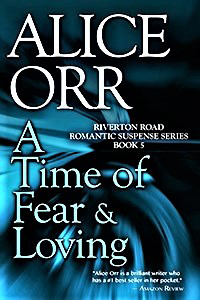I love a good villain. He does so much for a story. He gives the reader someone to hate, which engenders emotional involvement, commitment to the story, pages turning. He gives your hero someone to struggle against. He personifies the conflict that electrifies your narrative.
With so much weight to carry, your villain must be formidable.
Otherwise, your intelligent, active, resourceful hero would make short shrift of
this adversary and be on her way. The story is over then, because, when the conflict
resolves, reader interest wanes, your tale is done.
Introduce your adversary situation early. Get the conflict
started straight off. If this is a mystery, don't reveal his identity till almost
the end to keep the tension hook set deep in the reader. If this is suspense, unmask
the villain earlier on, at least in part, to establish how formidable he is.
We see this evil force on a collision course with the protagonist.
The character we have come to care most about and with whom we identify.
She doesn't share our insight and has no idea who her adversary might be. She only
knows she's in serious trouble, maybe physical danger too.
Our hero may know this person, may even trust him. Our
apprehension for her mounts as she unwittingly exposes herself to peril. The story
hook digs deeper into us with every page. Meanwhile, we must be just as deeply captured
by the villain's motivation.
For this reason, a wise storyteller avoids the Devils-Made-Him-Do-It
Villain. He's a psychopath or a sociopath, or on whichever path his sick psyche
compels him to take. He's propelled along that path by his demons. He does evil
because it is in his nature to do evil, and that's that.
He's scary for sure, but his motivation lacks complexity.
What further fascinating depths does a head case provide for your writerly imagination
to explore? And, we have seen him too often. There are far too many like him in
the real world, and in the work of aspiring novelists.
The prevalence of human monsters in contemporary life encourages
authors to portray them. But this villain has become fictionally boring. We've
read so many like him that he's dejà vu. Your twist on his twistedness must be truly
original to stand out from such a crowd.
Plus, I repeat for emphasis, he behaves the way he does because
he has no real choice. No nuanced confession is legitimately required. He's
a nut job, end of story, which makes him two-dimensional. He does evil because he
gets an insane kick out of it. He is a cartoon.
What distinguishes a cartoon from a credible villain who shivers
along our nerve endings? The difference is that we understand, on a mentally
engaging level, the reasons for the credible villain's behavior. We don't have to
sympathize with him, but we need to comprehend him.
You must conjure for us the genesis of this character's twistedness.
You make him real, and, consequently, scarier than ever. Then, you must present
him objectively. Your role is not to judge your adversary but to give him life on
the page, which means you tell his story as he would tell it.
Here is my secret for imagining your way into the evil soul.
Every villain is the hero of his own story. He is convinced his actions are justified
because, in the world as he perceives it, they are. He has motivations that are
clear, strong and believable, but warped.
The specific nature of that warp is yours to create. Brainstorm
the possibilities. Choose the most original option. Think as your villain thinks.
Dare to go there. Such characters are illuminated in dark places. The result is
the opposite of a cartoon. He lives with chilling authenticity. Your reader longs
to turn away, but cannot. There is no more riveting story hook than that.
For more insights into
writing and publishing – Visit my blog at www.aliceorrbooks.com
ALICE ORR is the author of 16 novels, 3 novellas, a memoir
and No More Rejections: 50 Secrets to Writing a Manuscript that Sells. A former
book editor and literary agent, Alice now lives her dream as a full-time
writer. Her latest novel is A Time of Fear and Loving: Riverton Road Romantic
Suspense - Book 5. Alice has two grown children and two perfect grandchildren
and resides with her husband Jonathan in New York City.
Author Website: www.aliceorrbooks.com
Author Blog: www.aliceorrbooks.com
Facebook: https://www.facebook.com/aliceorrwriter
Twitter: https://twitter.com/aliceorrbooks
Amazon Author Page: https://www.amazon.com/Alice-Orr/e/B000APC22E














